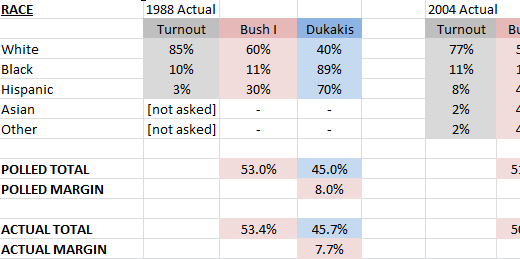Why We Lost: Not Enough Votes
First things first: I was wrong. Nate Silver was right. The Democrats did, indeed, have a turnout miracle. Final exit polling shows the Democrats with a D+6 advantage on election night, essentially matching their D+7 result in 2008, and burying once and for all the myth of the "D+4 ceiling," which Republicans have used to encourage themselves since the days of Clinton.
So where did that D+6 come from?
I've spent the past two days reading the different explanations for the election results, from all my favorite sources: The Wall Street Journal, the New York Times, the Puffington Host, the National Review, and, of course, FiveThirtyEight. (I've also spent the past two days moping, as my fiancée can attest. On top of everything else, we Minnesotans lost voter ID, we lost marriage, and our senate district lost all three of its long-held Republican seats. GAK.)
Various narratives are being constructed around the exit poll results. The gist of it is: Republicans lost group X, and therefore we need to reconsider policy Y so we can bring group X into the Republican tent. There are also some excellent counter-narratives developing about why changing our policies to buy votes is a bad idea. Nevertheless, we need to understand why we lost, so that we can approach the future with realistic expectations, which is exactly what we didn't have Tuesday morning.
Of course, we lost because we got fewer votes. At latest tally, President Obama won 60.90 million votes (50.4%), while Mitt Romney received only 57.96 million (48.0%). The margin of victory was 2.93 million votes, or 2.4%. Of course, presidents are not elected by popular vote, and that's a very good thing, but let's just consider the popular vote margins for the moment, since the particulars of the swing states change too much from election to election for them to be susceptible to analysis in a single blog post.
Many narratives have emerged about what Republicans need to do to shrink that 2.93 million vote gap, but I will focus here on a few of the strongest:
Republicans lost because the Hispanic vote is growing, and growing more liberal.
Republicans lost because white voters stayed home.
Republicans lost because they alienated women over pay equity and birth control.
Republicans lost because young people stayed energized from 2008.
Republicans lost because Romney turned off pro-life voters.
I've left out "Republicans lost because they opposed the bailouts," because, even though it likely accounts for the loss of Ohio, and certainly hurt us in Pennsylvania and Michigan, it's a very regional concern, so I'd really have to get down in the weeds of the electoral college in order to talk about it. I'm sticking to national exit polls for now.
Now, the election is close enough that the result is overdetermined, which means that there is more than one explanation for the result. The question is not "Which one of these interest groups explains our loss?" because more than one of them might fully explain it. The real question is "Which of these interest groups could have given us the largest margins with the least difficulty?"
The way we find that out is by comparing the 2012 results to the last two Republican victories in the popular vote: 2004 (when W. won a near-tie) and, where available, 1988 (when H.W. won a landslide). By fiddling with the 2012 turnout, we can see what would have happened if different groups of people had come out to vote. By fiddling with the 2012 results, we can see what would have happened if Romney had been more appealing to the people who did come out to vote.
Let's start with race. Here are the exit polls:

I thank the Roper Center, CNN, and Fox News for providing access to the National Election Pool exit polls for these three years, respectively. You'll notice that the margins from the exit polls differ slightly from the actual election results listed below them. This is for two reasons: partially, because of rounding errors and omitted refusals, but mostly because, as good as they are, exit polls are still just polls, and have a small amount of random sampling error.
Looking at these, it sure looks like the GOP has a race problem! One of the talking points that's been going around the blogosphere is that H.W. Bush won a landslide victory with 60% of the white vote, but Romney lost solidly with 60% of the white vote. There's a lot of truth in that: Hispanic, Black, and Asian support for Democrats is not new in American politics. Their growing influence is what's new. Demographics is destiny, and that destiny appears to have killed Mr. Romney -- and perhaps the Republican Party.
But does it have to be this way? George W. Bush won 44% of the Hispanic and Asian vote in 2004. What if Romney had done the same? Well, it would have looked like this:
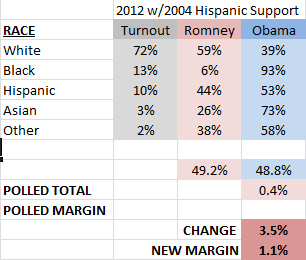
Romney winning 44% of the Hispanic vote instead of 30% of it would have netted him 3.5% of the popular vote. That would have given him a 1.1% lead over President Obama in the actual popular vote, and would have made the election a true tossup.
So we're done, right? Hispanics are the key to Republican electoral victory. Run the Jeb Bush/Marco Rubio ticket in 2016, and it's checkmate, Democrats! Thanks, James!
Not so fast. RealClearPolitics's Sean Trende (whose article is linked above) has another theory: it's not just that minorities grew this year; it's that whites stayed home. Trende's theory is that depressed working-class whites were inclined to elect a new President, but were turned off of Romney by Romney's aura of plutocracy, and so they decided not to vote at all. The "missing" white voters made it look like the minorities are even more important than they indubitably are.
Using 2008 exit polls as a baseline, Trende found that about 6.6 million eligible white voters, who show up in census data, did not show up at the polls this year. When I checked the census data and compared white (technically "non-Hispanic white") and Hispanic turnout, using 2004 populations as a baseline, and accepting Trende's assumption that 7 million ballots in the 2012 election have not yet been counted, I came up with pretty similar results:

Note that the turnout rates are lower than the official record, because our populations include those not eligible to vote. However, we don't care about the official turnout rate; we care about the trend in turnout between 2004 and 2008, so these figures are perfectly fine. And the net result is about 7.2 million white voters in the population who would have been expected to vote this year if they'd maintained 2004 voting rates -- but they didn't.
Adding 7,221,309 votes to the total white vote in 2012, without touching the results otherwise, would have only changed the turnout percentages by a point or two down the line -- but it turns out to make a world of difference:
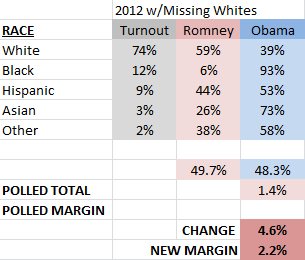
Turns out even a tiny percentage of whites is enough to swing the electorate nearly 5 points in Romney's direction! If Trende and I are right about the "missing whites," then Romney could have won this election -- handily -- without a single additional Hispanic voter. All he had to do was get the 2004 Bush base to the polls. That likely won't remain true for much longer, because Hispanics only continue to grow in electoral influence, but it does place the GOP's suddenly hysterical calls to make comprehensive immigration reform a platform plank (which I support, by the way) in perspective.
Narrative #3 about this election is that Romney himself didn't blow it. Todd Akin, Richard Mourdock, and the Catholic bishops ruined it for him, by making this election about contraceptive denial and rape insensitivity, which outraged and alienated women voters, who, in turn, joined the Democrats in response to stop the "war on women." This narrative appears to be borne out by the gender gap: Romney lost women by an astonishing 10 points. George W. Bush lost them by 3 points in 2004, and Bush's father won women by 2 in 1988. Case closed, right? Women are half the electorate, so losing them is devastating. I was writing up a paragraph saying just that when I noticed something funny in the numbers on race and sex:
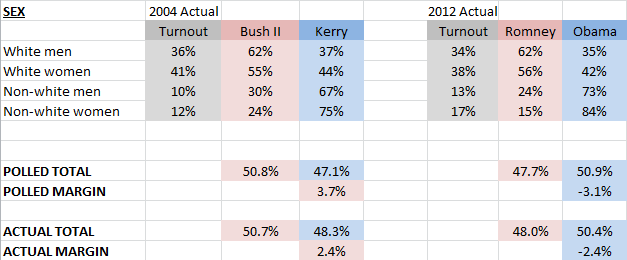
Look at that: among white women, Romney did better than George W. Bush. How very odd! But white women are the ones most likely to respond to the "war on women," because white women are somewhat more socially liberal, on average, than non-white women. So what's going on here?
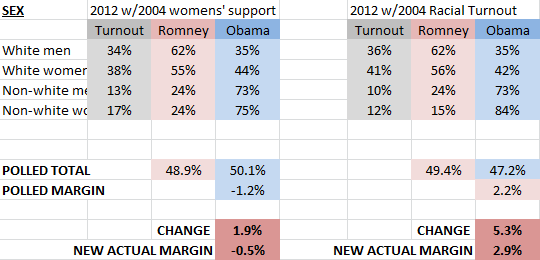
It turns out that, even if Romney had matched Bush's 2004 performance among female voters, Romney still would have lost the popular vote and the election. It would have been closer, but gender itself was not a determinative factor.
Much more interesting than that is the breakdown by race. When we change the racial composition back to the composition of 2004, but leave all else the same, we find that the growing gender gap is not a result of women leaving the Republican party. It is the result of non-whites in general, and non-white women especially, becoming more prolific and more monolithic liberal voters. This racial demographic change is surfacing in the gender statistics and makes a modest women problem look like a very big one.
Somebody call Messrs. Akin and Mourdock! They deserve to know that they may have shot themselves in the foot, but they're not the reason Mitt Romney lost the presidential election.
Moving on. What about those youth? If they stay energized like they are today, can we still win elections? Do we have a big youth problem?
Yes -- to both.

(Note that the 2012 exit polls replaced the 45-59 age group with the 45-65 age group, which throws off the numbers for old people a little bit. Also, the image is a bit small. Click to enlarge.)
If 18 to 29-year-olds had been disposed as they were in 2004 -- a little bit less numerous, a little bit more conservative -- Romney would have found himself in a tossup for the popular vote. Closing the age gap doesn't give Romney the clear win that the racial issues do, but it would certainly help. More worrisome, however, is the trend: George H.W. Bush won 53% of the youth 24 years ago. Those youth are now 42-63 years old... and still support Republicans by about the same margins. George W. Bush's youth were much more hostile to his proposition, and today's youth even moreso. We cannot hand over all the formative institutions of culture to progressivism for thirty years and expect anything better -- but the hostility of young people to Republican ideas, though a moderate problem at the moment, worries me more than the racial changes that are coming down the demographic pipe.
But that was not the biggest surprise of my night. That came when I took a look at the abortion numbers.
See, here's the thing: the permanent pro-life/pro-choice election war is essentially sisyphean. More than almost any other issue in American politics, polling numbers on abortion policy are rock-solid stable. Neither pro-lifers nor pro-choicers have been able to so much as inch toward a broad mandate. (That's why abortion is never banned by Republicans and never fully protected by Democrats.) We are the one faction of absolutely guaranteed voters on both sides of the aisle. Yes, Americans United for Life and Planned Parenthood will try to play up the importance of pro-life GOTV to party insiders, but making their interest group seem more important than it is is literally their job. The reality is, abortion partisans always show up to the polls.
...until 2012, when the pro-life movement stayed home. Check it out:

What. The. Hey. Supporters of abortion rights outnumbered opponents by unprecedented margins on Tuesday. If pro-lifers had shown up in proportions matching the 2004 vote, it would have netted Mitt Romney an average gain of 7.4 points in the popular vote, overcoming his deficit thrice over, giving him the clear electoral victory, and putting him within spitting distance of Barack Obama's popular vote margin in 2008.
Whoa whoa whoa, says my liberal friend. Hang on there. Maybe the pro-lifers didn't stay home. Maybe there are fewer pro-lifers than there were eight years ago. Maybe some moderate pro-lifers have gotten scared off by the extreme rhetoric and hardline positions the pro-life movement has taken over the past few years, like the Personhood movement. Maybe now America is finally beginning to develop a solid pro-choice majority.
Fair enough criticism. Is it accurate? Is America becoming more pro-choice? I dug up the Kaiser Family Foundation/Washington Post August 2012 abortion poll (whose question and answer choices almost exactly matched the options in the exit polls), and loaded its figures into the turnout column. If we use the general population as a baseline, not the Bush turnout machine of 2004, does that make Romney's pro-life problem any smaller?
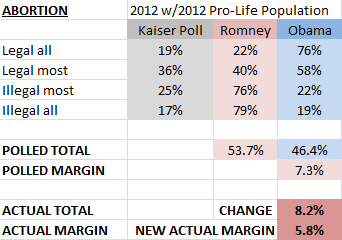
Actually, it makes Romney's pro-life problem even bigger.
And it is big. Let me put it in perspective.
All else being equal, if pro-lifers and pro-choicers had come out to vote in numbers proportionate to their weight within the population -- as they have done in previous cycles, including 2004 -- then Romney would have had a 5.8% lead in the popular vote, and would have won, on average, Florida, Virginia, Ohio, Colorado, and Pennsylvania. He would have put Iowa and New Hampshire in play. All told, his victory in the electoral college would have ended up somewhere between 295 and 305 electoral votes -- no landslide, but a commanding victory, greater than either of George W. Bush's wins. That's without lifting a finger to win any other demographic. Just getting the missing pro-life voters to the polls would have been enough to swing nearly 100 electoral votes away from the President over to Mr. Romney.
I do not care to speculate on what happened to pro-lifers this cycle that made them so much less motivated than their counterparts on the Left. My first thought was, "Oh, the Evangelical values voters must have stayed home." Only they didn't. Romney actually did better with Evangelical voters than President Bush did in the famous "values voters" election of 2004. Romney's standing would have been hurt by falling to Bush's level of Evangelical support:

So where'd all the pro-lifers go? I leave that to wiser pundits than I to figure out. All I'm saying is, these are the numbers, and, to sum up, this is why we lost:

That, according to the exit polls, is how the Great Democratic Turnout Miracle of 2012 came to pass.
I leave interpretation and narrative-construction to others. For myself, I have managed to get "Young Folks", by Peter, Bjorn, and John stuck in my head, thanks to that last table, and I have to go find some way of dealing with that. Good night.
* * *
As always, if you detect a mathematical or methodological error in this analysis, please let me know in the comments! I am no Nate Silver, but I am great at publishing corrections.

